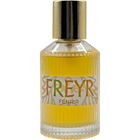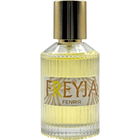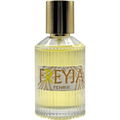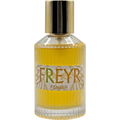
loewenherz
917 Reviews
Translated · Show original

loewenherz
Helpful Review
12
No Trace of Viðareiði
Whoever suggests a perfume for a new entry in the database, I think, might as well write the appropriate first review for it. So let's go, here we go!
Let’s start where Hela comes from. In the Faroe Islands, 'Føroyar' in Faroese - eighteen islands in the middle of the North Atlantic, halfway between Scotland and Iceland, and that’s how it looks there. Stark, treeless landscapes in gray-green, thrown under wild skies. Rugged cliffs full of screaming seabirds and quiet fjords with tiny villages at their edges. In the meantime, tunnels and bridges connect most of these islands - in one of these tunnels, an underwater roundabout - a single tiny shopping center in the no less tiny capital Tórshavn - and now also Faroese perfume. 'Finally', I didn’t think.
Let’s continue right there. The Faroe Islands, as reported, are located in the Nordic nowhere, and much of it looks like nowhere, despite the dramatic beauty of the Faroese landscape. And yet - in the mostly only supermarket in about every third village, you can buy mangoes. Olives from Sicily. Sushi. Of everything, there’s rather little, of course - but much in the Faroe Islands is indeed not so different from the rest of Europe. In the tiny shopping center, there’s a Burger King and a Concept Store (!) and right in the middle - Bang! - Faroese perfume. In the Duty Free shop at Vágar Airport - one like everywhere else in this world - Fenrir's Hela is also sold.
'Hela' (or 'Hel'), the namesake of this perfume, is by the way the goddess of death in the Nordic pantheon and sister of the Midgard serpent and the Fenris wolf, who will devour the world at Ragnarök, the end of all things. The German word 'Hölle' (hell) etymologically comes from the same root. Younger readers might think of her horned depiction in the Marvel universe by the Australian Cate Blanchett, who played her so wonderfully cool and sardonic. Choosing the name of the goddess of the underworld certainly raises great expectations for an iconic, dark, dramatic scent - whether Faroese or not. It isn’t, well.
You have to understand this paradox when approaching Hela. A perfume from the end of the world that is no longer such, named after the mistress of the underworld - in a Concept Store diagonally opposite Burger King. Nothing about Hela is barren, is rugged, is highly dramatic. Nothing here is underworldly or sardonic black. Instead, we find a warm, very sweet, quite pleasant (fashion) scent that could stand under any name in any bottle in any store somewhere in Europe or elsewhere. Just as Faroese supermarkets look like any supermarket. That’s a bit sad. And quite nice for the Faroese.
Conclusion: Viðareiði is the name of a remote village on the northern island of Viðoy, where the spectacular cliff Enniberg is located. Here it doesn’t smell like Hela, not like Ambroxan, jasmine, or cherry - how could it? Rather at the international Vágar Airport, from where you can fly several times a day to Copenhagen, Reykjavík, and Gran Canaria, between Guerlain, Bacardi, and Moet Chandon - like everywhere in this world...
Let’s start where Hela comes from. In the Faroe Islands, 'Føroyar' in Faroese - eighteen islands in the middle of the North Atlantic, halfway between Scotland and Iceland, and that’s how it looks there. Stark, treeless landscapes in gray-green, thrown under wild skies. Rugged cliffs full of screaming seabirds and quiet fjords with tiny villages at their edges. In the meantime, tunnels and bridges connect most of these islands - in one of these tunnels, an underwater roundabout - a single tiny shopping center in the no less tiny capital Tórshavn - and now also Faroese perfume. 'Finally', I didn’t think.
Let’s continue right there. The Faroe Islands, as reported, are located in the Nordic nowhere, and much of it looks like nowhere, despite the dramatic beauty of the Faroese landscape. And yet - in the mostly only supermarket in about every third village, you can buy mangoes. Olives from Sicily. Sushi. Of everything, there’s rather little, of course - but much in the Faroe Islands is indeed not so different from the rest of Europe. In the tiny shopping center, there’s a Burger King and a Concept Store (!) and right in the middle - Bang! - Faroese perfume. In the Duty Free shop at Vágar Airport - one like everywhere else in this world - Fenrir's Hela is also sold.
'Hela' (or 'Hel'), the namesake of this perfume, is by the way the goddess of death in the Nordic pantheon and sister of the Midgard serpent and the Fenris wolf, who will devour the world at Ragnarök, the end of all things. The German word 'Hölle' (hell) etymologically comes from the same root. Younger readers might think of her horned depiction in the Marvel universe by the Australian Cate Blanchett, who played her so wonderfully cool and sardonic. Choosing the name of the goddess of the underworld certainly raises great expectations for an iconic, dark, dramatic scent - whether Faroese or not. It isn’t, well.
You have to understand this paradox when approaching Hela. A perfume from the end of the world that is no longer such, named after the mistress of the underworld - in a Concept Store diagonally opposite Burger King. Nothing about Hela is barren, is rugged, is highly dramatic. Nothing here is underworldly or sardonic black. Instead, we find a warm, very sweet, quite pleasant (fashion) scent that could stand under any name in any bottle in any store somewhere in Europe or elsewhere. Just as Faroese supermarkets look like any supermarket. That’s a bit sad. And quite nice for the Faroese.
Conclusion: Viðareiði is the name of a remote village on the northern island of Viðoy, where the spectacular cliff Enniberg is located. Here it doesn’t smell like Hela, not like Ambroxan, jasmine, or cherry - how could it? Rather at the international Vágar Airport, from where you can fly several times a day to Copenhagen, Reykjavík, and Gran Canaria, between Guerlain, Bacardi, and Moet Chandon - like everywhere in this world...
2 Comments





 Almond
Almond Ambroxan
Ambroxan Cherry
Cherry Iris
Iris Jasmine
Jasmine Liquorice
Liquorice Moss
Moss Vanilla
Vanilla Woody notes
Woody notes


